Pakistan’s even-more-troubled-than-usual elections on Thursday were marked by a government shutdown of mobile Internet services and bloody terrorist attacks that killed at least 26 people, including several children.
Pakistan held its vote during a grueling economic crisis and a deep political schism, as former Prime Minister Imran Khan sat out the contest in prison after running a populist, Islamist comeback campaign.
Given the charges against Khan, he arguably belongs in jail, and his return to power would not have been a hopeful development for either Pakistan or the civilized world. On the other hand, he is clearly one of the most popular political figures in the country, and preventing his large number of supporters from voting for him by throwing him in jail and virtually outlawing his party was bound to increase tensions.
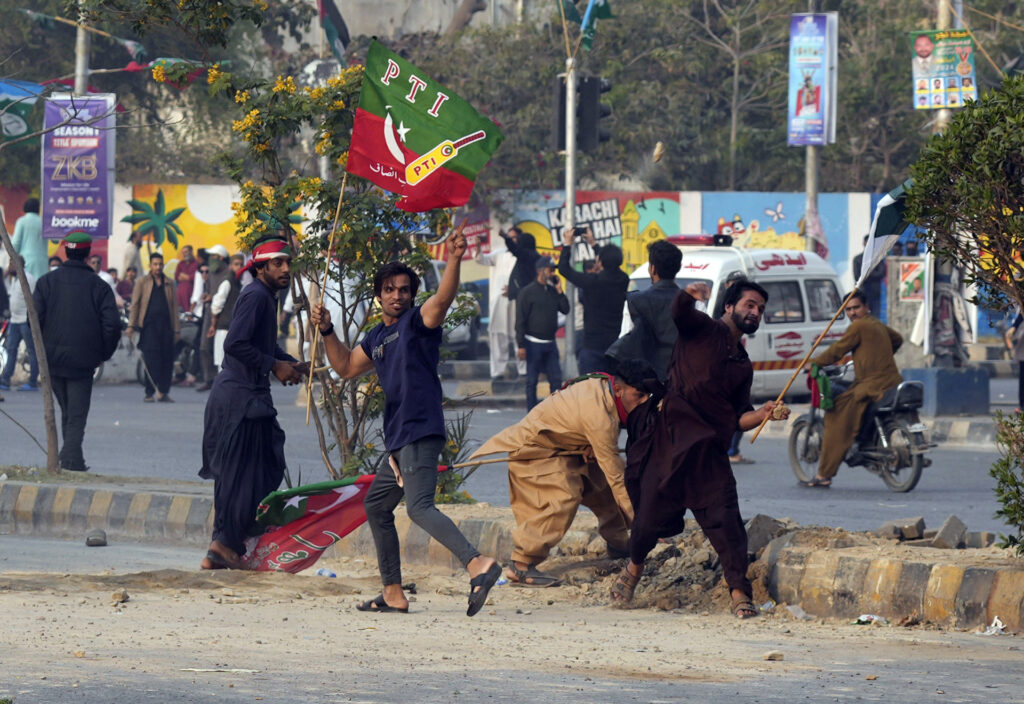
Supporters of former Prime Minister Imran Khan and the Pakistan Tehreek-e-Insaf (PTI) Party clash with police during an election campaign rally in Karachi, Pakistan, on January 28, 2024. (AP Photo/Fareed Khan)
The Khan saga also left Pakistani politics so roiled that election observers had a difficult time predicting who would win the election. It is entirely possible that no one will. Balloting results should be made public on Friday.
Terrorists detonated two bombs in the southwestern province of Balochistan on Wednesday, killing at least 26 people in the vicinity of offices for political candidates.
Some Pakistani officials blamed Indian agents for the bombings, but the Islamic State later claimed responsibility, saying its operatives “blew up a motorbike” at an “election gathering.”
The first detonation occurred outside the office of independent candidate Asfandyar Kakar. Eyewitnesses said the powerful bomb killed many of its victims instantly and left bodies “scattered everywhere.”
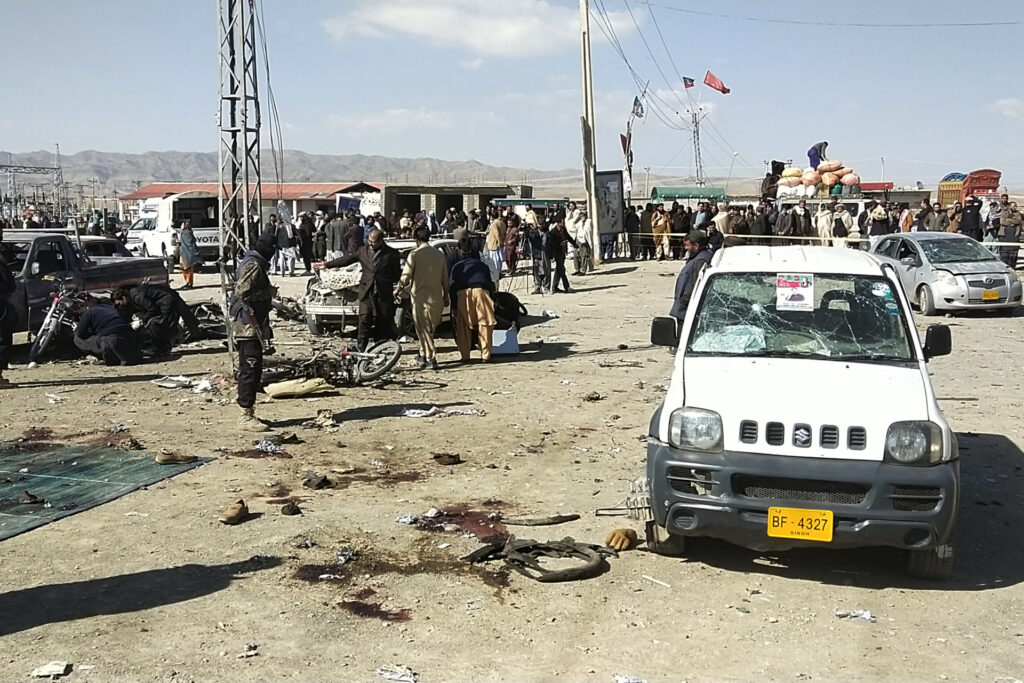
Security personnel inspect the site of a bomb blast outside the office of an independent candidate in Pishin district, around 50 kilometers (30 miles) from Quetta on February 7, 2024, on the eve of Pakistan’s national elections. (BANARAS KHAN/AFP via Getty Images)
The second bombing struck the election offices of the Islamist party Jamiat Ulema-e-Islam-Fazl (JUI-F) near the border with Afghanistan.
JUI-F is mostly concentrated in the Balochistan region. While it advocates a stern version of Islamic law with some similarities to Islamic State theology, ISIS may also view it as a competitor for religious authority. JUI-F also advocates negotiations with the Taliban to resolve cross-border issues, while ISIS hopes to destabilize the Taliban regime and take control of Afghanistan.
On Thursday, at least six Pakistan security officers were killed when militants in Balochistan and Khyber Pakhtunkhwa targeted a police convoy and patrol with bombs and guns.
In response to the bombings, Pakistan’s Interior Ministry said “precious lives have been lost,” so enhanced “security measures” were necessary. These measures included deploying military personnel to protect polling stations and imposing a nationwide shutdown on mobile Internet services.
Caretaker Prime Minister Anwaar ul Haq Kakar insisted his government was not attempting to rig the polls, intimidate opposition candidates, or influence the election outcome by shutting down the Internet. On the other hand, Kakar said he could not guarantee “absolute” freedom and fairness in the election.
“What I can assure you is that despite all our shortcomings and flaws which there are in the system, there is no systematic pattern or institutional pattern where we are targeting a specific party or group,” Kakar said on Thursday.
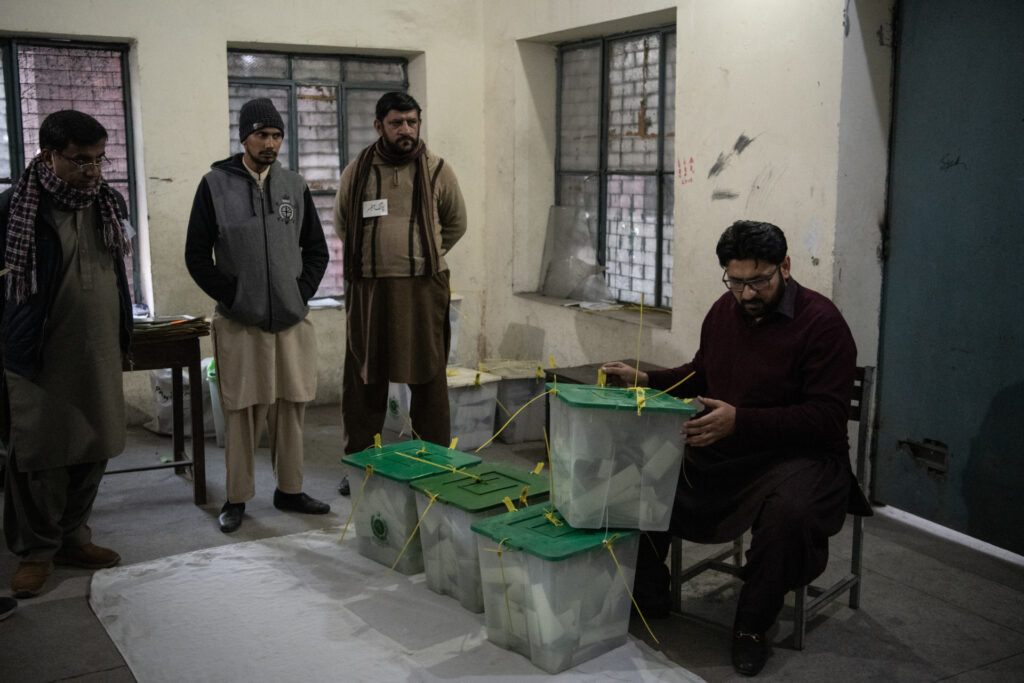
A Pakistani election worker prepares to unseal ballot boxes ahead of the start of the ballot count following the close of voting in Pakistan’s general election at a polling station on February 8, 2024, in Lahore, Pakistan. (Rebecca Conway/Getty Images)
Kakar was responding to U.N. Human Rights High Commissioner Volker Turk expressing concerns on Tuesday that a “pattern of harassment, arrests, and prolonged detentions” has been directed at Imran Khan and leaders of his Pakistan Tehreek-e-Insaf (PTI) Party.
Turk’s office expected Pakistani courts to provide “due process and fair trial rights” to all the accused and insisted “all eligible parties must be able to compete fairly.”
The U.N. was also concerned about Pakistan’s practice of maintaining separate voter lists for minority communities, such as the Ahmadis, an unusual Muslim sect that often faces discrimination and persecution in Pakistan. The Ahmadis are boycotting the election to protest the government forcing them onto separate voter lists and refusing to protect them from abuse.
Kakar said he was “surprised” by the U.N.’s criticism and promised to investigate credible reports of harassment:
If that is the case, then I will look into it that whether it was an isolated individual case with few or a couple of individuals, or was it a broad-based pattern happening to thousands of the people, millions of the people, then yes, you can come back and accuse us that this is what we have done.
Kakar also insisted the Pakistani military is not rigging the election or controlling the government and said he was not himself a puppet of military rulers, as his critics allege.
The military has had an especially dim view of Khan and his party ever since PTI supporters rioted and damaged military property following Khan’s arrest in May. The disdain is mutual, as Khan has accused the military and intelligence services of conspiring with the U.S. and UK governments to evict him from office, throw him in jail, and murder him.
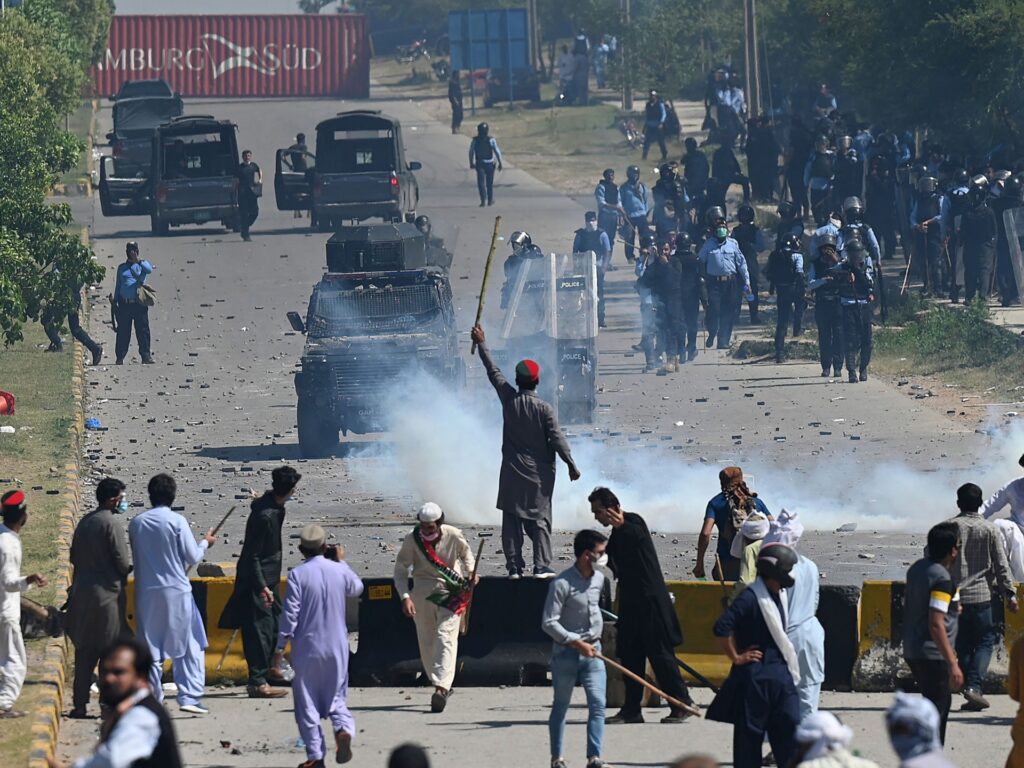
Police use teargas to disperse Pakistan Tehreek-e-Insaf (PTI) Party activists and supporters of former Pakistani Prime Minister Imran Khan during a protest against the arrest of their leader in Islamabad on May 10, 2023. (AAMIR QURESHI/AFP via Getty Images)
“They have a view on everything, but they are not directly influencing the democratic processes and the political processes of this country,” he said of the military.
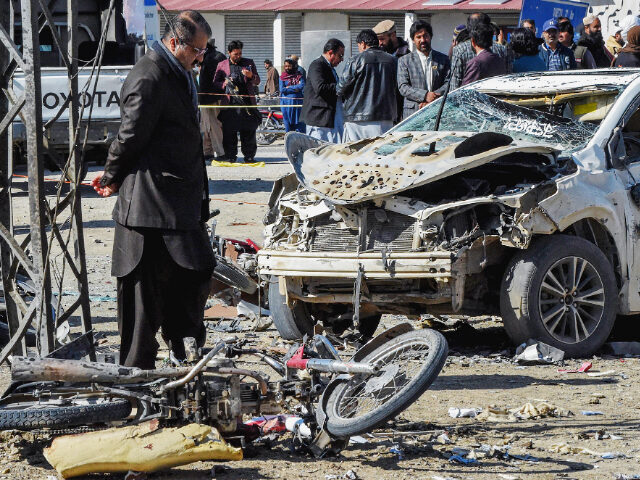
COMMENTS
Please let us know if you're having issues with commenting.